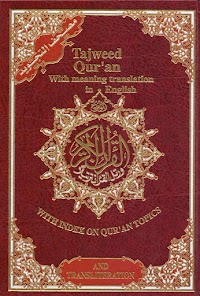Related Posts
- كتاب: Taiweed Quran Miraculous Dual Verses on the Quranic Pages=مصحف التجويد مثاني إعجازية في الصفحات القرآنية (ملون)16 Jun 20182
عنوان الكتاب: Taiweed Quran Miraculous Dual Verses on the Quranic Pages=مصحف التجويد مثاني إعجازية في الصفحات القرآنية (ملون) المؤلف...Read more »
- كتاب: Tajweed Quran with Meanings Translation and Transliteration in English=مصحف التجويد مع ترجمة المعاني إلى الإنجليزية (ملون)16 Jun 20183
عنوان الكتاب: Tajweed Quran with Meanings Translation and Transliteration in English=مصحف التجويد مع ترجمة المعاني إلى الإنجليزية (ملون)...Read more »
- Awqaf Magazine ( No.35)19 Mar 20190
مؤلف الكتاب: kuwait awqaf public foundation الناشر: Kuwait Awqaf Public Foundation سنة النشر: 2018 عدد صفحات الكتاب: 28 عدد زيارات الك...Read more »
- The Holy Quran with Colour Coded English Transliteration and Translation16 Jun 20180
عنوان الكتاب: The Holy Quran with Colour Coded English Transliteration and Translation (ملون) المؤلف: تنزيل من رب العالمين الم...Read more »
- Christianity at Glance and Refuting Its Belief06 Apr 20180
This booklet intends to provide a general view about Christianity. It also spots light on its doctrines like, trinity, the Bible, crucifixion,...Read more »
- Selected Hadiths -Part four -06 Apr 20180
SELECTED HADITHS With Biographies of Narrators and Benefits of Eighty Hadiths Download Your web browser doesn't have a PDF plugin. Ins...Read more »
- كتاب: The Noble Qur’ân English Translation of the meanings and commentary=القرآن الكريم وترجمة معانيه إلى اللغة الإنكليزية (الإنجليزية)27 Feb 20180
عنوان الكتاب: The Noble Qur’ân English Translation of the meanings and commentary=القرآن الكريم وترجمة معانيه إلى اللغة الإنكليزية (الإنج...Read more »
- كتاب: The Noble Qur’ân English Translation of the meanings and commentary=القرآن الكريم وترجمة معانيه إلى اللغة الإنكليزية (الإنجليزية) (ملون)27 Feb 20182
عنوان الكتاب: The Noble Qur’ân English Translation of the meanings and commentary=القرآن الكريم وترجمة معانيه إلى اللغة الإنكليزية (الإنج...Read more »











Post a Comment
EmoticonClick to see the code!
To insert emoticon you must added at least one space before the code.